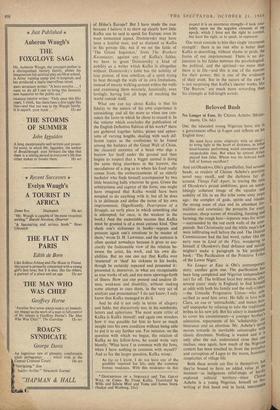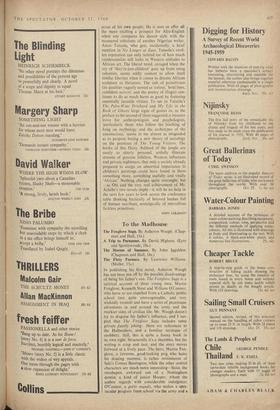Beloved Bush
OBI, the educated young Nigerian hero, sits a government office in Lagos and reflects on his
English boss:
He must have come originally with an idea to bring light to the heart of darkness, to tribal head-hunters performing weird. ceremonies and unspeakable rites. But when he arrived Africa played him false. Where was his beloved bush full of human sacrifices?
And yet Okonkwo, Obi's grandfather, had severed
heads, as readers of Chinua Achebe's previous novel may recall, and the darkness lay all
around. Things Fall Apart, in tracing the 11 in of Okonkwo's proud ambitions, gave an aston-
ishingly ishingly coherent image of the squalor and nobility of life in an Ibo tribe some sixty years ago: the complex of gods, spirits and rituals; the strong sense of clan and its attendant fa' malities and courtesies; the proverbs for every occasion; sharp scenes of wrestling, feasting and farming; the rough huts—separate ones for wives —surrounded by the red earth walls of the corn' pounds. But Christianity and the white man's laW were infiltrating well before the end. The District
Commissioner had the last word, rather like the navy men in Lord of the Flies, wondering to himself if Okonkwo's final defiance and suicide mightn't make a paragraph in his projected book : 'The Pacification of the Primitive Tribes of the Lower Niger.' No Longer at Ease is Obi's contemporril story, another grim one. The pacification has been long completed and Nigerian independence isn't far off. The brilliant local boy returns, after several years' study in England, to find himself at odds with both his family and the well-wishers —the Umuofia Progressive Union—who sub- scribed to send him away. He falls in love with Clara, an osu or 'untouchable,' and makes hilly self unpopular by refusing to take the traditional bribes in his new job. But his salary is inadequate to cover his commitments—a younger brothers education, repayments of his 'scholarship; car insurance and an abortion. Mr. Achebe's We' moves towards its inevitable catastrophe with
classic directness. Nothing is wasted and it is
only after the sad, understated close that Ole realises, once again, how much of the Nigerian context has been touched' in, from the prejudice and corruption of Lagos to the warm, hotnil tje simplicities of village life.
Both these novels are fine In themselves, but
they're bound to have an added value at the moment—as indigenous relief-maps of hardly explored cultural territory—since Chir Achebe is a young Nigerian, himself an writing at first hand and in lucid, uneccentriC
in
prose of his own people. He is seen to offer all the more exciting a prospect for Afro-English when one compares his decent style with the mannered solecisms of another Nigerian writer, Amos Tutuola, who gets, incidentally, a brief mention in No Longer at Ease. Tutuola's swol- len reputation can only remind me of how much condescension still lurks in Western attitudes to African art. The liberal mind, enraged when the cry of 'they're-just-children' goes up from smug colonials, seems oddly content to allow itself similar liberties when it comes to discuss African sculpture or literature. The cult of primitivism (its qualities vaguely sensed as 'colour,' bold lines, confident naivele, and the poetry of illogic) con- tinues to do as much harm as good by fostering essentially juvenile virtues. To see in Tutuola's The, Palm-Wine Drinkard and My Life in the Bush of Ghosts large signs of genius or, as the preface to the second of these suggested, a treasure trove for anthropologists and psychologists, 'particularly those who follow the teaching of Jung on mythology and the archetypes of the unconscious,' seems to me almost as misguided as to propose basing a new theory of sociology on the premises of The Young Visitors. The books of this Daisy Ashford of the jungle are surely so utterly personal, artfully illiterate streams of genuine folklore, Western influences and private nightmare, that only a society already prepared to assign an abnormal importance to children's paintings could have found in them something more, something usefully and vitally 'African.' Nothing changes quite overnight, but —as Obi and the very real achievement of Mr. Achebe's two novels imply—it will be no help in the next few years to look across the conference table thinking hectically of beloved bushes full of human sacrifices, nostalgically of marvellous feckless primitives.
JOHN COLEMAN



















































 Previous page
Previous page